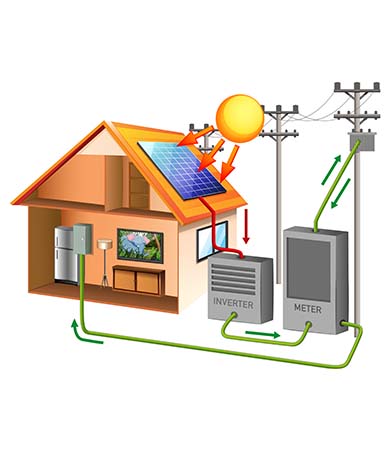Understand the power of Net Metering and selling the excess energy in this blog.
Introduction:
In recent years, the adoption of solar energy has surged as individuals and businesses seek cleaner, more sustainable alternatives to traditional power sources. Solar power offers a plethora of benefits, from reducing carbon emissions to lowering electricity bills. However, one often-overlooked aspect of solar energy is net metering – a policy that allows solar system owners to sell excess electricity back to the grid. Understanding net metering and its benefits is crucial for maximizing the advantages of solar energy.
The Rise of Solar Energy:
The sun, our nearest star, provides an abundant source of renewable energy. Solar panels, also known as photovoltaic (PV) cells, convert sunlight into electricity, offering a clean and sustainable alternative to fossil fuels. The declining costs of solar panels and advancements in technology have made solar energy increasingly accessible to homeowners, businesses, and communities worldwide.
What is Net Metering?
Net metering is a billing mechanism that allows solar energy system owners to receive credit for the electricity they generate and feed back into the grid. When a solar system generates more electricity than is consumed on-site, the excess power is exported to the grid, effectively running the meter backward. This surplus energy is credited to the owner's utility account, offsetting future electricity consumption.
How Net Metering Works:
The process of net metering involves a bi-directional meter installed by the utility company. This meter tracks both the electricity consumed from the grid and the surplus electricity generated by the solar system. During periods of high solar generation, such as sunny days, when the system produces more electricity than needed, the excess energy flows back into the grid, spinning the meter backward and accruing credits.
Benefits of Net Metering:
1. Financial Savings:
Net metering allows solar system owners to significantly reduce their electricity bills or even generate revenue. By selling excess electricity back to the grid, owners can offset the cost of their electricity consumption during times when solar production is low, such as at night or during cloudy weather. Over time, this can result in substantial savings on energy costs.
2. Return on Investment:
For homeowners and businesses, investing in solar panels can offer a compelling ROI, especially when coupled with net metering. The upfront cost of installing a solar system is offset by the savings generated from reduced electricity bills and potential income from selling surplus energy. With proper planning and favorable net metering policies, the payback period for solar investments can be shortened significantly.
3. Environmental Impact:
Net metering promotes the adoption of renewable energy sources like solar power, contributing to a cleaner and more sustainable energy future. By incentivizing the generation of clean electricity, net metering helps reduce greenhouse gas emissions and dependence on fossil fuels, mitigating climate change and environmental degradation.
4. Grid Stability:
Distributed solar generation, facilitated by net metering, enhances grid stability and reliability. By generating electricity closer to the point of consumption, solar systems reduce strain on the grid, particularly during peak demand periods. This decentralized approach to energy production also improves resilience against grid failures and outages.
Challenges and Considerations:
While net metering offers numerous benefits, its implementation can face challenges and regulatory complexities. Some utilities may impose caps or limitations on net metering credits, potentially hindering the economic viability of solar investments. Additionally, variations in net metering policies and regulations across different regions can impact the attractiveness of solar energy adoption.
Furthermore, the integration of large-scale solar installations into the grid requires careful planning to ensure compatibility with existing infrastructure and grid operations. Strategies such as energy storage systems and demand response mechanisms can complement net metering, optimizing the utilization of renewable energy resources and enhancing grid flexibility.
Conclusion:
Net metering plays a pivotal role in unlocking the full potential of solar energy by incentivizing the production and consumption of clean electricity. By allowing solar system owners to sell excess power back to the grid, net metering promotes financial savings, environmental sustainability, and grid stability. As the global transition towards renewable energy accelerates, policies supporting net metering will continue to be instrumental in driving the widespread adoption of solar power. Embracing net metering not only benefits individual solar adopters but also contributes to a more resilient, efficient, and sustainable energy landscape for generations to come.



